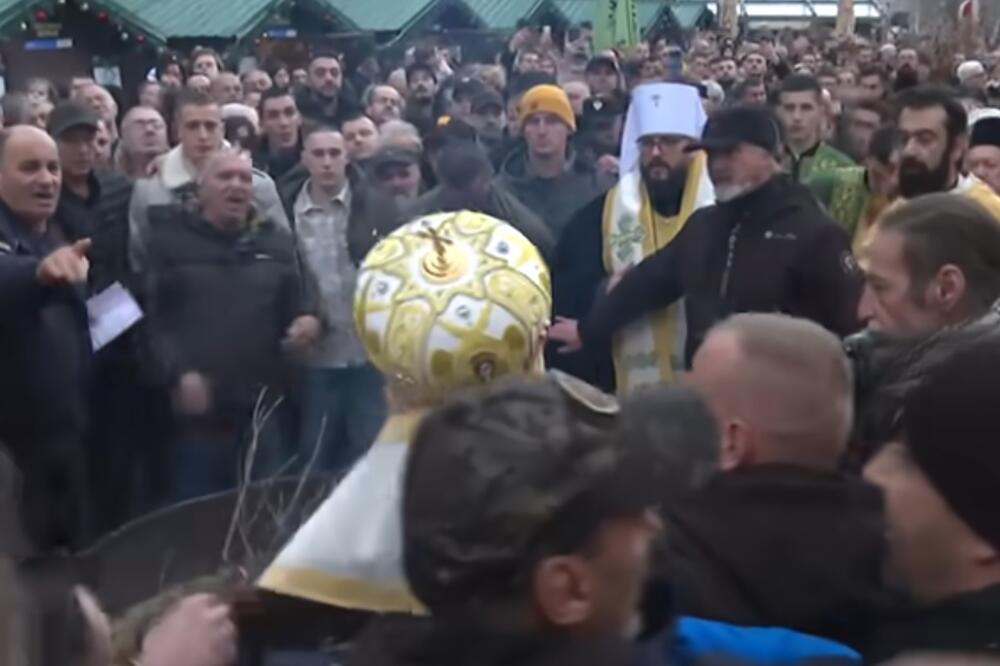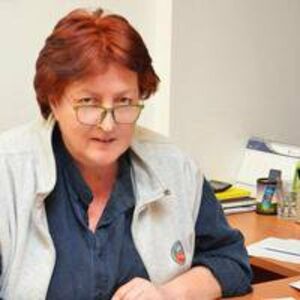But it's the devil, but they are more magical, but somewhat more difficult than both - conditioning preparations for the entry of Serbian national parties into the Euro-Atlantic Government - only the deputy of Metropolitan Joanikija has never had such a peaceful coexistence...
How lucky he was that every one was like this. Not only the epistle, but also every statement and every word since he became the Serbian high priest in Montenegro.
That "in our spiritual heritage we have a wonderful folk custom of making peace with everyone before Christmas" and that "we can talk to each other brotherly and come to an agreement".
That "in our homeland, Montenegro, we have many accumulated problems that we can only solve through brotherly dialogue, mutual understanding and respect".
That "that dialogue will be successful if, in accordance with the Gospel of Christ, we all renounce, however necessary, our vanity, offensiveness, bad memory and selfishness, showing good will and willingness to put the general interest above our individual one".
Yes, the peaceful coexistence that the SPC metropolitan called for certainly did not apply to the CPC, but how fortunate that two of its high priests remembered some of the principles of that coexistence at least on Christmas Day.
* * *
Unfortunately, it's not that they didn't remember, but with their combined forces, they drove a hawthorn stake into the Montenegrin church, which was killed a second time.
And now, with a heavy heart, I have to write that this was the saddest Christmas Day in Cetinje since 1920.
And I will add - that edict of the Serbian King Alexander on the abolition of the CPC became golden during this shame that its former bishops, Mihailo and Boris, prepared for it a century later.
Why ex when they are not cleared (yet)?
Because the Montenegrin Orthodox Church - as an institution - has been abolished again, only that there is no one to issue an edict about it.
The fact that no church as a community of believers can be abolished is not a consolation for Montenegrins who sincerely care about the CPC. There are so few of them that any possible attempt at its institutional renewal will be doomed in advance.
And the fact that during the eight decades of renewed Montenegrin statehood, not only the majority, but not even a third of Montenegrins were involved in the restoration of the work of the Montenegrin Church - neither when they were 90 percent, nor when they fell below 45 percent - is the main cause of the collapse of the CPC.
Today's disgrace is only a logical consequence of such attitude of Montenegrins towards their church.
* * *
It was logical to expect that the fiery conflict in addition to burning Christmas trees would continue on social networks, but not that the two sides would achieve such a degree of action unity in accusing the third.
That third party was mostly the SPC, occasionally the DPS, some accused the communists as well, only on the question of Montenegrins' guilt there was not even a remote doubt.
The factual description, however, shows something else.
Until the so-called During the AB revolution, the Serbian church was valued slightly higher by the communists than the unrecognized Montenegrin church, despite the fact that it was the only one recognized.
How many Orthodox believers there were in total could easily be estimated by the empty temples even on the dates marked with red letters in the church calendar.
And by the choice of the metropolitan even better.
* * *
The first metropolitan whose election the Montenegrin state could influence was Tomo Dajković, a Serb from Drušić.
The Montenegrins, of whom there were more than 1961 in 400.000, did not protest, but really sympathized with him and called him Bishop Danilo.
They didn't mind the fact that he was married, nor that he worked for the police of the Kingdom of SHS and was suspected of killing - not to use that harsh word - communists.
It did not occur to them that through the then very accessible head of state, Druga Blaž, they would pledge to seat a Montenegrin "from the bottom of the bucket" who became a monk in his early youth, during the war the abbot of Visoki Dečani and in peacetime of the Savina Monastery - Antonija Abramović - to sit in the chair of Saint Peter.
The second metropolitan whose election - at that time still Montenegrin - could be influenced by the state was Risto Radović, a Serb from Morača.
Montenegrins didn't protest even in 1991, when there were 380.467 of them, if you ignore the ten percent of liberals that Montenegro never cared about...
Metropolitan Amfilohije managed to make the Serbian Church in Montenegro the strongest, most numerous and influential socio-political organization, with an emphasis on the latter activity.
And that the DPS regime, in the name of the SPC/MCP, registers all the churches and monasteries that the Communists, three decades earlier, did not give as a dowry to Bishop Danilo.
In total: 12 square kilometers of church land, about 720 churches and 84 monasteries with all movable church heritage.
Plus 12 million euros in cash, known for...
* * *
The state of Montenegro, which has not been Montenegrin for a long time even according to the Constitution, could not influence the election of the third metropolitan. Some Serbian parties did, and Jovan Mićović, a Serb from Banjan, was elected.
On the eve of the inauguration of Metropolitan Ioanniki, there was not a rebellion, but a war almost broke out.
Why?
Because of some Montenegrins who have completely forgotten the material from the last decades.
First of all, the lesson that they studied with obvious teaching, that the Serbian Church before, during and after the so-called war for peace had the same political goals as the Montenegrin secular government embodied in the DPS.
Those goals had the support of 80 percent of Montenegro, and this - according to the results of the 1991 census - implies that a convincing majority of Montenegrins, and not only Serbs, were behind the Great Serbian ecclesiastical and political plans.
Nevertheless, even in such a situation - rather, precisely because of such a situation - the renewal of the work of the Montenegrin Orthodox Church in 1993 did make sense.
Unfortunately, it was meaningless already after three years, in the same way that the work of the original Montenegrin sovereignists was meaningless.
Thanks to the regime at that time and the election of a suitable bishop, the Montenegrin Orthodox Church was transformed into a branch of the DPS for the MZ Grude.
And then, following the example of an even (too) large parent party, that small branch also split into two wings.
Which is healthy?
None, after that embarrassment in front of the Court.
* * *
That there is no healthy wing in the DPS is also confirmed by the silence with which that party washes its hands not only from Christmas Day in Cetinje, but also from its own merits for such a collapse - maybe even the end - of the Montenegrin Orthodox Church.
In vain, that silence echoes much louder than the clamor for the "high-treasonous basic contract" by which the DPS washed its hands of the high treason committed by its governments by registering not only its assets but also those of the CPC in the SPC.
In order to avoid facing its own guilt and the guilt of its eternal leader on the church issue, that party - unprovoked - filed an indictment against the NSD leader and the President of the Assembly for - one congratulatory message.
- By congratulating the unconstitutional day of the RS, Andrija Mandić confirmed that he was installed at the head of the parliament in order to implement his nationalist agenda from there and hinder Montenegro on its way to the EU - this is how the DPS concluded.
We will still have to wait for that party's conclusion about how unconstitutional the formation of the Serbian Republic in 1993 was in the middle of the still-living multi-ethnic Bosnia and Herzegovina in XNUMX.
As long as the DPS youth doesn't distance himself from the creator and implementer of "that nationalist agenda" in his party.
Or cover your ears and once and for all stop looking for a culprit in the parties that were created in this century for what theirs did in the past.
Until then, whenever DPS speaks about RS and the Serbian world, I will have to speak about the sanctity of facts.
In the transcript from the session of the Council for Harmonization of Positions on the State Policy of the FR Yugoslavia on January 9, 1993, it is written that Milo Đukanović said that "over time the conditions will be created for Republika Srpska to join Montenegro, Serbia and Republika Srpska Krajina":
"In the state-building sense, we have an almost optimal result in Bosnia and Herzegovina. When I say 'almost optimal result', then I guess it is not disputed that we are satisfied with the territories we hold there. It is almost optimal because we have not yet realized the ultimate goal - that (Republika Srpska , ed.) becomes an integral part of the common state!"
He presented the details of the way to achieve that ultimate goal four years later:
"Let Momir Bulatović not protect Serbia from me! The government that I lead had to help the Serbian people in Herzegovina and Republika Srpska for years, secretly from Slobodan Milošević and Momir Bulatović, when they decisively and heartlessly let it down."
The Serbian entity was grateful to him for years, the help of Radovan Karadžić and Ratko Mladić's army was also discussed in Strasbourg, before the European Court of Human Rights:
"I can't forget the help that Milo Đukanović and his government gave to the RS Army and the Serbian people, even when Slobodan Milošević imposed sanctions on us," Momčilo Mandić said ten years ago.
He was so grateful that he included the topographical details:
"Fuel for our tanks, which fought from Foča, through Srebrenica to Bihać and beyond, was sent by Milo Đukanović. Who knows what would have happened to the Republika Srpska if that help had not been there" - the former Minister of Justice of the RS testified under oath.
PS We cannot know what would have happened if there had not been, but it is highly probable that there would have been no holidays or decorations. Although, if we're being honest, after everything Njegoš has done in the last thirty years, Montenegro really deserved the Order of Baja Little Knindža. First of all, it goes without saying...
Bonus video:





